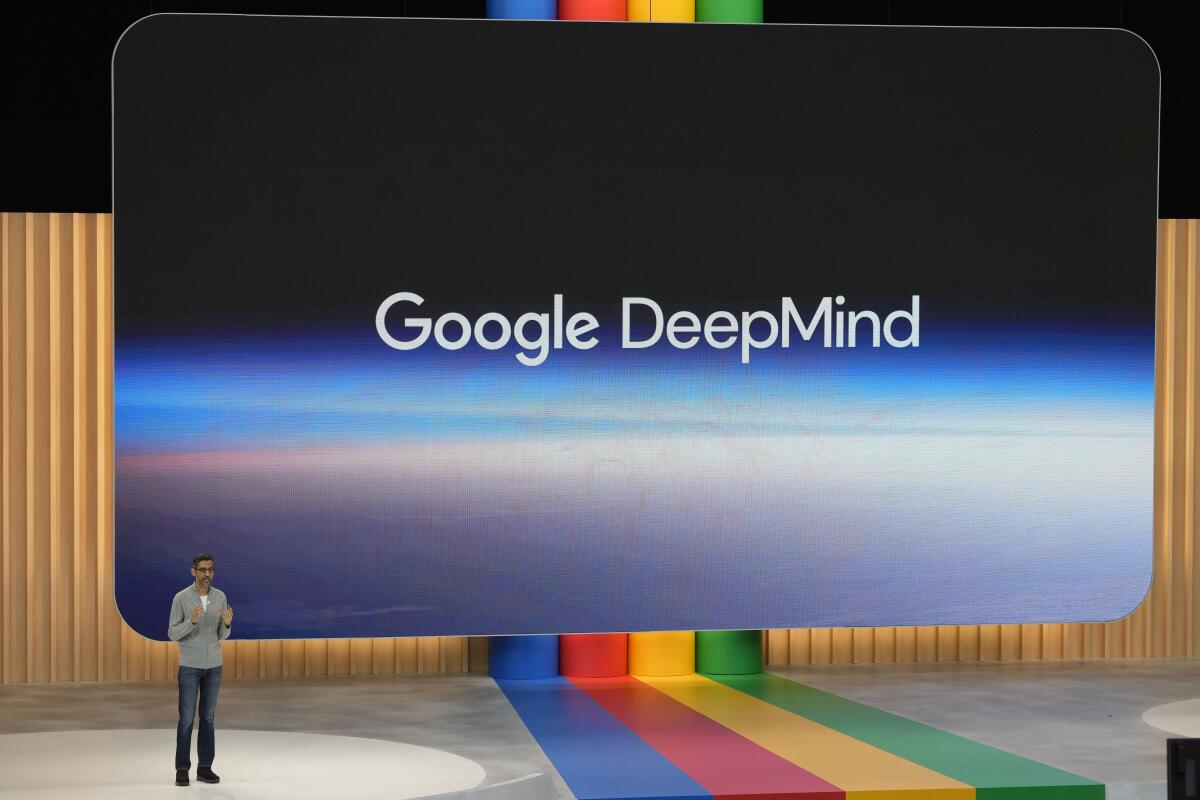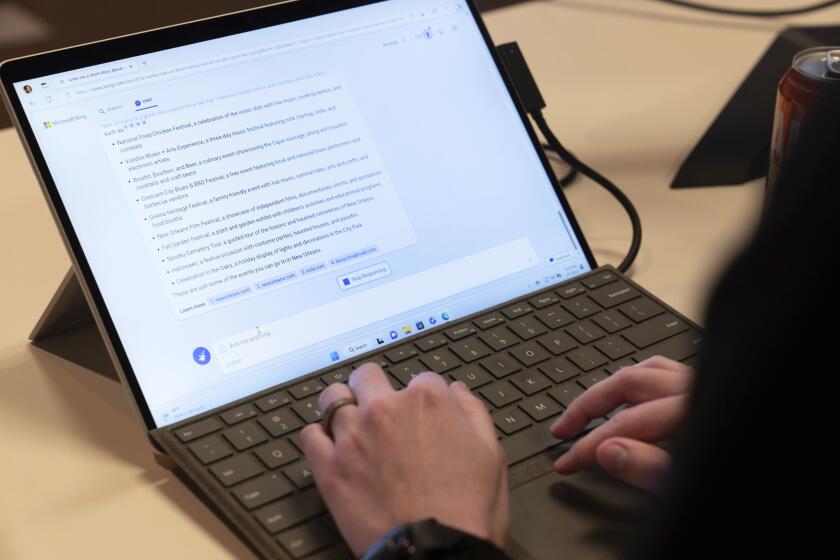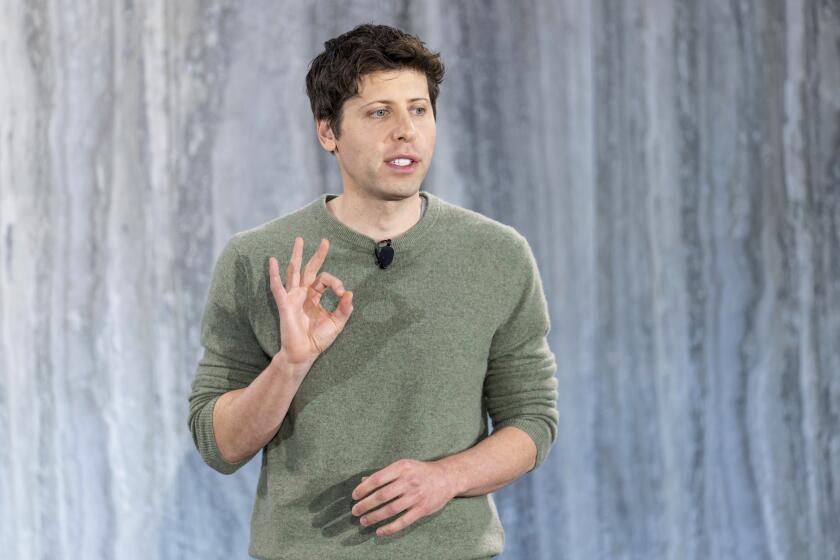Google ups the stakes in AI race with Gemini, a technology trained to behave more like humans

- Share via
Google took its next leap in artificial intelligence Wednesday with the launch of project Gemini, an AI model trained to behave in human-like ways that’s likely to intensify the debate about the technology’s potential promise and perils.
The rollout will unfold in phases, with less sophisticated versions of Gemini called Nano and Pro being immediately incorporated into Google’s AI-powered chatbot Bard and its Pixel 8 Pro smartphone.
With Gemini providing a helping hand, Google promises Bard will become more intuitive and better at tasks that involve planning. On the Pixel 8 Pro, Gemini will be able to quickly summarize recordings made on the device and provide automatic replies on messaging services, starting with WhatsApp, according to Google.
Gemini’s biggest advances won’t come until early next year when its Ultra model will be used to launch Bard Advanced, a juiced-up version of the chatbot that initially will be offered only to a test audience.
The AI, at first, will only work in English throughout the world, although Google executives assured reporters during a briefing that the technology will have no problem eventually diversifying into other languages.
The tragedy of AI is not that it stands to replace good journalists, but that it takes every gross, callous move made by management to degrade the production of content — and promises to accelerate it.
Based on a demonstration of Gemini for a group of reporters, Google’s Bard Advanced might be capable of unprecedented AI multitasking by simultaneously recognizing and understanding presentations involving text, photos and video.
Gemini will also eventually be infused into Google’s dominant search engine, although the timing of that transition hasn’t been spelled out yet.
“This is a significant milestone in the development of AI, and the start of a new era for us at Google,” declared Demis Hassabis, chief executive of Google DeepMind, the AI division behind Gemini. Google prevailed over other bidders, including Facebook parent Meta, to acquire London-based DeepMind nearly a decade ago, and has since melded it with its Brain division to focus on Gemini’s development.
The technology’s problem-solving skills are being touted by Google as being especially adept in math and physics, fueling hopes among AI optimists that it may lead to scientific breakthroughs that improve life for humans.
But an opposing side of the AI debate worries about the technology eventually eclipsing human intelligence, resulting in the loss of millions of jobs and perhaps even more destructive behavior, such as amplifying misinformation or triggering the deployment of nuclear weapons.
Google and Microsoft think chatbots that can converse like humans are the future of web search. But the human workers who make sure they don’t screw up are treated as disposable.
“We’re approaching this work boldly and responsibly,” Google CEO Sundar Pichai wrote in a blog post. “That means being ambitious in our research and pursuing the capabilities that will bring enormous benefits to people and society, while building in safeguards and working collaboratively with governments and experts to address risks as AI becomes more capable.”
Gemini’s arrival is likely to up the ante in an AI competition that has been escalating for the last year with San Francisco startup OpenAI and longtime industry rival Microsoft.
Backed by Microsoft’s financial muscle and computing power, OpenAI was already deep into developing its most advanced AI model, GPT-4, when it released the free ChatGPT tool late last year. That AI-fueled chatbot rocketed to global fame, bringing buzz to the commercial promise of generative AI and pressuring Google to push out Bard in response.
Just as Bard was arriving on the scene, OpenAI released GPT-4 in March and has since been building in new capabilities aimed at consumers and business customers, including a feature unveiled in November that enables the chatbot to analyze images. It has been competing for business against other rival AI startups such as Anthropic and even its partner, Microsoft, which has exclusive rights to OpenAI’s technology in exchange for the billions of dollars that it has poured into the startup.
The alliance so far has been a boon for Microsoft, which has seen its market value climb by more than 50% so far this year, primarily because of investors’ belief that AI will turn into a gold mine for the tech industry. Google’s corporate parent, Alphabet, also has been riding the same wave with its market value rising more than $500 billion, or about 45%, so far this year. Despite the anticipation surrounding Gemini in recent months, Alphabet’s stock edged down slightly in trading Wednesday.
It’s been a whirlwind few days for OpenAI, one of the biggest names in the booming AI sector. Why was CEO Sam Altman abruptly fired — and how did he wind up re-hired again so quickly?
Microsoft’s deepening involvement in OpenAI during the last year, coupled with OpenAI’s more aggressive attempts to commercialize its products, has raised concerns that the nonprofit has strayed from its original mission to protect humanity as the technology progresses.
Those worries were magnified last month when OpenAI’s board abruptly fired CEO Sam Altman in a dispute revolving around undisclosed issues of trust. After backlash that threatened to destroy the company and result in a mass exodus of AI engineering talent to Microsoft, OpenAI brought Altman back as CEO and reshuffled its board.
With Gemini coming out, OpenAI may find itself trying to prove its technology remains smarter than Google’s.
“I am in awe of what it’s capable of,” Eli Collins, Google DeepMind vice president of product, said of Gemini.
In a virtual news conference, Google declined to share Gemini’s parameter count — one but not the only measure of a model’s complexity. A white paper released Wednesday outlined the most capable version of Gemini outperforming GPT-4 on multiple-choice exams, grade-school math and other benchmarks but acknowledged ongoing struggles in getting AI models to achieve higher-level reasoning skills.
Some computer scientists see limits in how much can be done with large language models, which work by repeatedly predicting the next word in a sentence and are prone to making up errors known as hallucinations.
“We made a ton of progress in what’s called factuality with Gemini. So Gemini is our best model in that regard. But it’s still, I would say, an unsolved research problem,” Collins said.
More to Read
Inside the business of entertainment
The Wide Shot brings you news, analysis and insights on everything from streaming wars to production — and what it all means for the future.
You may occasionally receive promotional content from the Los Angeles Times.













